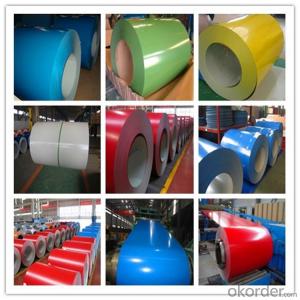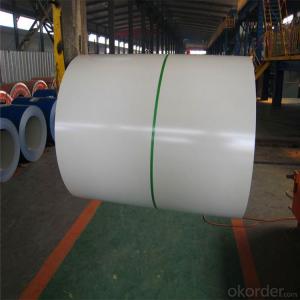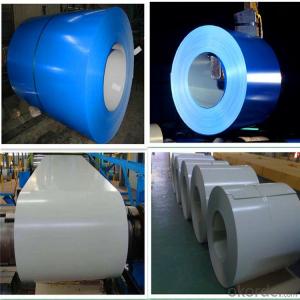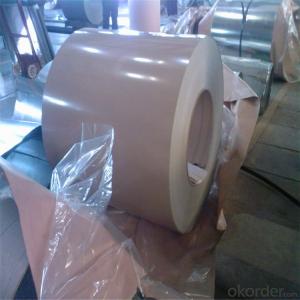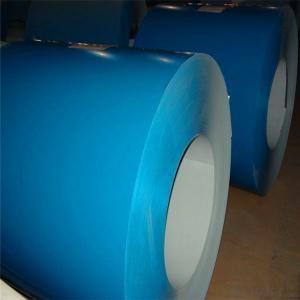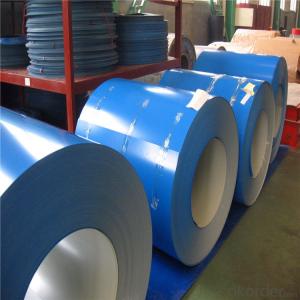China Supplier Color Coated Galvanized Steel Coil Prime PPGI
- Loading Port:
- Shanghai
- Payment Terms:
- TT OR LC
- Min Order Qty:
- 100 m.t.
- Supply Capability:
- 50000 m.t./month
OKorder Service Pledge
OKorder Financial Service
You Might Also Like
Item specifice
China Supplier Color Coated Galvanized Steel Coil Prime PPGI
Description of China Supplier Color Coated Galvanized Steel Coil Prime PPGI
Product | PPGI/PPGL |
Capacity | 5,000 tons/month |
Base material | Hot dipped galvanized steel |
Thickness | 0.2-2.0mm |
Width | 600-1250mm(according to your need) |
Coil Weight | 3-6tons |
Quality | SGCC, DX51D |
Color | RAL No. or customers samples’ color |
Zinc-coating | 30g/m2-180g/m2 |
Coil ID | 508mm/610mm |
Technique | Cold rolled—hot dipped galvanized—color coated |
Painting | Top painting:15~25μm |
Back painting: 6~10μm | |
Tolerance | Thickness: +/-0.02mm |
Width:+/-2mm | |
Shipment time | within 15-45 workdays |
Payment | T/T, L/C at sight |
Packing | Standard export packing |
The special order can be negotiated. | |
Application of China Supplier Color Coated Galvanized Steel Coil Prime PPGI
APPLICATION OF OUR PREPAINTED STEEL | ||||||||||
Construction | Outside | Workshop,agricultural warehouse,residential precast unit | ||||||||
corrugated roof,roller shutter door,rainwater drainage pipe,retailer booth | ||||||||||
Inside | Door,doorcase,light steel roof stucture,folding screen,elevator,stairway,ven gutter,Construction Wall | |||||||||
Electrical applicance | Refrigerator,washer,switch cabnet,instrument cabinet,air conditioning,micro-wave owen,bread maker | |||||||||
Fuiniture | Central heating slice,lampshade,chifforobe,desk,bed,locker,bookself | |||||||||
Carrying trade | Exterior decoration of auto and train,clapboard,container,isolation lairage,isolation board | |||||||||
Qthers | Writing panel,garbagecan,billboard,timekeeper,typewriter,instrument panel,weight sensor,photographic equipment | |||||||||
Products Show of China Supplier Color Coated Galvanized Steel Coil Prime PPGI

Product Advantages
1.With nearly 20 years experience in prepainted steel, accommodate different marketdemands. | ||||||||||||||
2.'Quality first, service first' is our business aim; 'The good faith get respect,cast quality market' is our Business philosophy . | ||||||||||||||
3.Having two series producttion line,with the abbual production capacity of 240000 tons. | ||||||||||||||
4.Exceed International ISO9001:2008&ISO14001:2004 quality and environmental standards | ||||||||||||||
5.Meet with ROHS standard |
Company Information
CNBM International Corporation is the most important trading platform of CNBM group.
Whith its advantages, CNBM International are mainly concentrate on Cement, Glass, Iron and Steel, Ceramics industries and devotes herself for supplying high qulity series of refractories as well as technical consultancies and logistics solutions.


F A Q
1, Your advantages?
professional products inquiry, products knowledge train (for agents), smooth goods delivery, excellent customer solution proposale
2, Test & Certificate?
SGS test is available, customer inspection before shipping is welcome, third party inspection is no problem
3, Factory or Trading Company?
CNBM is a trading company but we have so many protocol factories and CNBM works as a trading department of these factories. Also CNBM is the holding company of many factories.
4, Payment Terms?
30% TT as deposit and 70% before delivery.
Irrevocable L/C at sight.
5, Trading Terms?
EXW, FOB, CIF, FFR, CNF
6, After-sale Service?
CNBM provides the services and support you need for every step of our cooperation. We're the business partner you can trust.
For any problem, please kindly contact us at any your convenient time.
We'll reply you in our first priority within 24 hours.
- Q:What is the role of cobalt in special steel?
- Due to its unique properties and characteristics, cobalt plays a crucial role in special steel. It serves as a significant alloying element in the production of high-performance steel alloys, particularly those used in demanding applications where strength, hardness, and heat resistance are vital. Cobalt's primary function in special steel is to enhance its overall strength and toughness. By forming a solid solution with iron, cobalt creates a fine-grained microstructure that improves the mechanical properties of the steel. This results in increased hardness, wear resistance, and the ability to withstand high temperatures and harsh environments. Moreover, cobalt improves the steel's resistance to corrosion and oxidation, making it suitable for extreme conditions in industries like aerospace, oil and gas, and automotive. Additionally, it enhances the steel's magnetic properties, making it valuable in electrical and electronic devices. Another essential role of cobalt in special steel is its ability to facilitate the formation of stable carbides. The addition of cobalt aids in the precipitation and dispersion of carbides, contributing to the steel's high-temperature strength and excellent retention of hardness at elevated temperatures. Furthermore, cobalt assists in refining the grain structure of the steel, resulting in improved machinability and surface finish. It also allows for better control over the hardenability of the steel, determining its capacity for heat treatment and achieving desired hardness levels. To summarize, cobalt plays a multifaceted and indispensable role in special steel. It enhances the steel's strength, hardness, and toughness, improves its resistance to corrosion and oxidation, and enables it to withstand high temperatures. Cobalt also aids in refining the microstructure of the steel, enhancing machinability and allowing precise control over its hardenability.
- Q:What is the impact of grain size on the mechanical properties of special steel?
- The impact of grain size on the mechanical properties of special steel is significant. Grain size refers to the size and distribution of individual crystals within the steel structure. It is determined by factors such as the cooling rate during solidification and subsequent heat treatments. In general, a smaller grain size in special steel leads to improved mechanical properties. This is because smaller grains offer a greater number of grain boundaries, which act as barriers to dislocation movement and improve the strength of the steel. Smaller grains also provide a more uniform microstructure, enhancing the overall toughness and resistance to fracture. Additionally, a smaller grain size promotes higher hardness and increased wear resistance in special steel. This is due to the increased number of grain boundaries that hinder the movement of dislocations, preventing plastic deformation and leading to higher hardness values. On the other hand, larger grain sizes can negatively impact the mechanical properties of special steel. Larger grains have fewer grain boundaries, allowing dislocations to move more freely. This results in reduced strength, toughness, and hardness of the steel. Furthermore, larger grains can also lead to anisotropic behavior, where the mechanical properties differ in different crystallographic directions, making the steel more susceptible to failure under certain loading conditions. Therefore, controlling and optimizing the grain size in special steel is crucial to achieve desired mechanical properties. This can be achieved through precise heat treatments, such as annealing or quenching, which control the cooling rate and subsequent recrystallization processes. By controlling the grain size, special steel can be tailored to meet specific application requirements, ensuring optimal mechanical performance and reliability.
- Q:Can special steel be used in the oil and gas industry?
- Yes, special steel can be used in the oil and gas industry. Special steel alloys such as stainless steel, duplex steel, and super duplex steel are widely utilized in various applications within the industry due to their exceptional corrosion resistance, high strength, and heat resistance properties. These specialized steels provide increased durability and performance in harsh environments, ensuring the safe and efficient operation of oil and gas equipment and infrastructure.
- Q:What are the factors that affect the wear resistance of special steel?
- There are several factors that affect the wear resistance of special steel, including the composition of the steel itself, the hardness of the steel, the presence of any alloying elements, the microstructure of the steel, and the heat treatment process used. Other factors such as the type and intensity of the wear, environmental conditions, and lubrication also play a role in determining the wear resistance of special steel.
- Q:How does special steel contribute to the flexibility of products?
- Special steel contributes to the flexibility of products by providing enhanced strength, durability, and resistance to corrosion. Its unique properties allow manufacturers to design and produce products that can withstand high stress, extreme temperatures, and harsh environments. This flexibility enables the creation of a wide range of products that can be used in diverse industries, including automotive, aerospace, construction, and manufacturing.
- Q:How does special steel withstand high-velocity impacts?
- Special steel is able to withstand high-velocity impacts due to its unique properties and composition. One key factor is its high strength and hardness, which allows it to resist deformation and fracture under extreme forces. Special steel also often contains alloying elements such as chromium, molybdenum, nickel, and vanadium, which contribute to its exceptional toughness and impact resistance. Furthermore, special steel is often heat-treated to enhance its mechanical properties. Through processes such as quenching and tempering, the steel's microstructure is altered, resulting in a fine-grained structure with improved strength and hardness. This heat treatment also enhances the steel's ability to absorb and dissipate energy during high-velocity impacts, reducing the risk of failure. Moreover, special steel is often designed with specific alloys and compositions to enhance its performance in particular applications. For example, some grades of steel are specifically engineered for armor applications, where they must withstand high-velocity impacts from projectiles. These steels may have additional elements such as boron or titanium, which further enhance their ability to resist penetration and deformation under extreme loads. In summary, special steel's ability to withstand high-velocity impacts is attributed to its high strength, hardness, toughness, and impact resistance. Its unique composition, heat treatment processes, and targeted design make it a reliable choice for applications where impact resistance is crucial.
- Q:What are the properties of wear-resistant stainless steel?
- Wear-resistant stainless steel has several properties that make it highly effective in resisting wear and tear. Firstly, it has a high hardness level, which allows it to withstand abrasive forces and maintain its shape under heavy loads. Additionally, it exhibits excellent corrosion resistance, preventing rust or degradation even in harsh environments. This type of stainless steel also possesses good impact resistance, meaning it can withstand sudden impacts without cracking or breaking. Furthermore, wear-resistant stainless steel typically has a low coefficient of friction, reducing frictional forces and minimizing wear when in contact with other materials. Overall, these properties make wear-resistant stainless steel a durable and reliable choice for applications where wear and tear are major concerns.
- Q:What is the hardness range of special steel?
- The hardness range of special steel typically varies between 20 and 70 HRC (Rockwell Hardness Scale).
- Q:What is the role of special steel in sustainable manufacturing?
- Special steel plays a crucial role in sustainable manufacturing by offering numerous advantages that contribute to environmentally friendly production processes. Firstly, special steel is highly durable and has a long lifespan, which reduces the need for frequent replacement or repairs. This durability minimizes waste and extends the life cycle of products, reducing the overall environmental impact. Furthermore, special steel has excellent recyclability properties. It can be recycled multiple times without losing its quality or performance, making it a sustainable choice for manufacturers. By incorporating recycled special steel into the production process, manufacturers can reduce their reliance on virgin materials and decrease energy consumption and greenhouse gas emissions associated with the extraction and production of new steel. Moreover, special steel offers high strength and lightweight characteristics, enabling manufacturers to design products that are more energy-efficient. For example, in the automotive industry, using special steel in the manufacturing of vehicles reduces their weight, leading to improved fuel efficiency and lower emissions. This contributes to the reduction of carbon footprint and supports sustainable transportation. Special steel also plays a significant role in the production of renewable energy technologies. Wind turbines, solar panels, and hydropower systems require sturdy and resilient materials to withstand harsh conditions. Special steel provides the necessary strength, corrosion resistance, and durability required for these renewable energy infrastructure projects. By enabling the development of such technologies, special steel contributes to the growth of the renewable energy sector, which is essential for transitioning to a more sustainable energy mix. In conclusion, special steel plays a vital role in sustainable manufacturing by offering durability, recyclability, lightweight properties, and strength. By using special steel, manufacturers can reduce waste, energy consumption, and emissions, while also enabling the development of energy-efficient products and renewable energy technologies. Incorporating special steel into manufacturing processes is an essential step towards achieving a more sustainable and environmentally friendly future.
- Q:What are the different coating techniques for special steel?
- There are several different coating techniques that can be used for special steel to enhance its properties and protect it from corrosion or wear. Some of the commonly used coating techniques include: 1. Electroplating: In this technique, a thin layer of metal is deposited onto the surface of the steel using an electric current. This can be done with various metals such as zinc, nickel, or chrome, depending on the desired properties of the coated steel. 2. Hot-dip galvanizing: This technique involves immersing the steel in a molten zinc bath, which forms a protective layer on the surface. Hot-dip galvanizing is commonly used for outdoor applications, as it provides excellent corrosion resistance. 3. Powder coating: In this technique, a dry powder is applied to the surface of the steel and then heated to form a protective coating. Powder coating offers a wide range of colors and finishes and provides both corrosion and wear resistance. 4. Thermal spraying: This technique involves heating a coating material, such as zinc or aluminum, to a high temperature and then spraying it onto the steel surface. Thermal spraying is commonly used for high-temperature applications, as it provides excellent resistance to heat and corrosion. 5. PVD coating: Physical vapor deposition (PVD) is a technique where a thin film of metal is deposited onto the steel surface through a vacuum process. PVD coatings can provide various properties such as hardness, wear resistance, and decorative finishes. 6. Carbonitriding: This is a surface hardening technique where the steel is heated in a furnace containing a carbon and nitrogen-rich atmosphere. Carbonitriding forms a hard, wear-resistant layer on the steel surface, improving its durability. These coating techniques offer different advantages and are chosen based on the specific requirements of the application. By applying these coatings, special steel can be made more resistant to corrosion, wear, and other forms of degradation, extending its lifespan and enhancing its performance in various industries.
1. Manufacturer Overview |
|
|---|---|
| Location | |
| Year Established | |
| Annual Output Value | |
| Main Markets | |
| Company Certifications | |
2. Manufacturer Certificates |
|
|---|---|
| a) Certification Name | |
| Range | |
| Reference | |
| Validity Period | |
3. Manufacturer Capability |
|
|---|---|
| a)Trade Capacity | |
| Nearest Port | |
| Export Percentage | |
| No.of Employees in Trade Department | |
| Language Spoken: | |
| b)Factory Information | |
| Factory Size: | |
| No. of Production Lines | |
| Contract Manufacturing | |
| Product Price Range | |
Send your message to us
China Supplier Color Coated Galvanized Steel Coil Prime PPGI
- Loading Port:
- Shanghai
- Payment Terms:
- TT OR LC
- Min Order Qty:
- 100 m.t.
- Supply Capability:
- 50000 m.t./month
OKorder Service Pledge
OKorder Financial Service
Similar products
New products
Hot products
Related keywords
